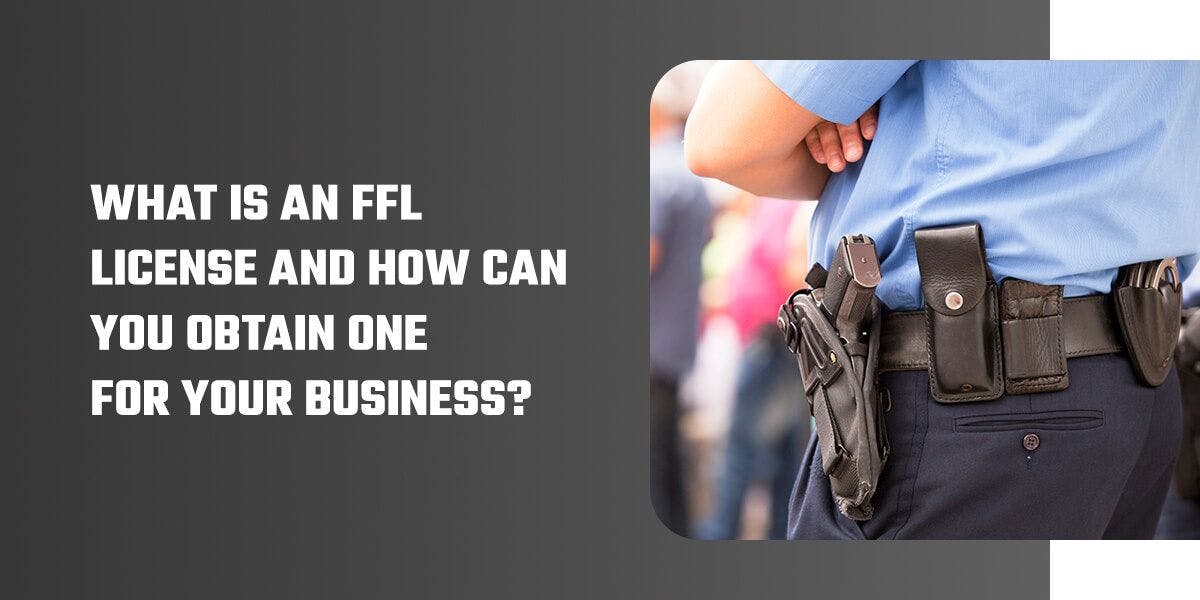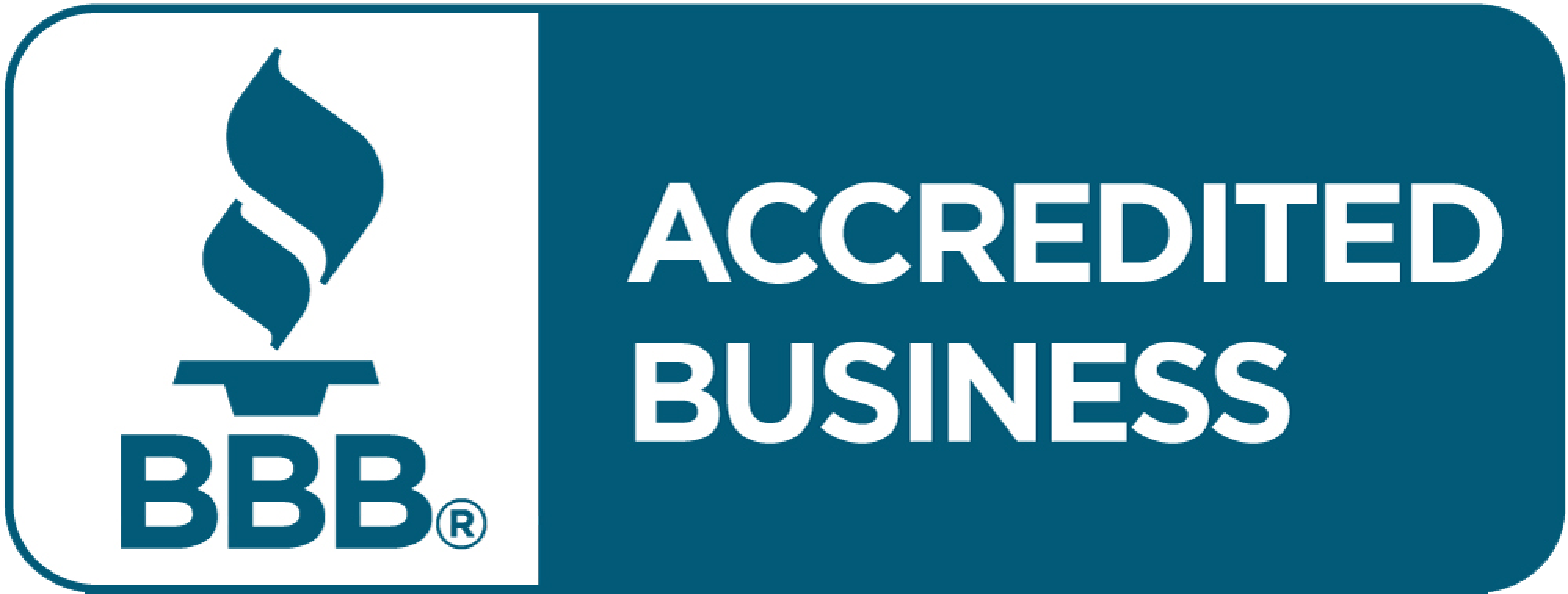If you’re planning on starting a firearms business, you’re in luck, as the firearms industry is booming. In 2020, gun sales were higher than in any previous year — 1.5 million more background checks for obtaining a firearm were completed than four years previously. Here are some tips on how to get a federal firearms license.
While you’ve probably heard you need an FFL to open your firearms and ammunition business, what exactly is an FFL? In this article, you’ll discover what an FFL is, who’s eligible for an FFL, what types of FFLs exist and how to get an FFL to get your firearms business up and running.
WHAT IS AN FFL?
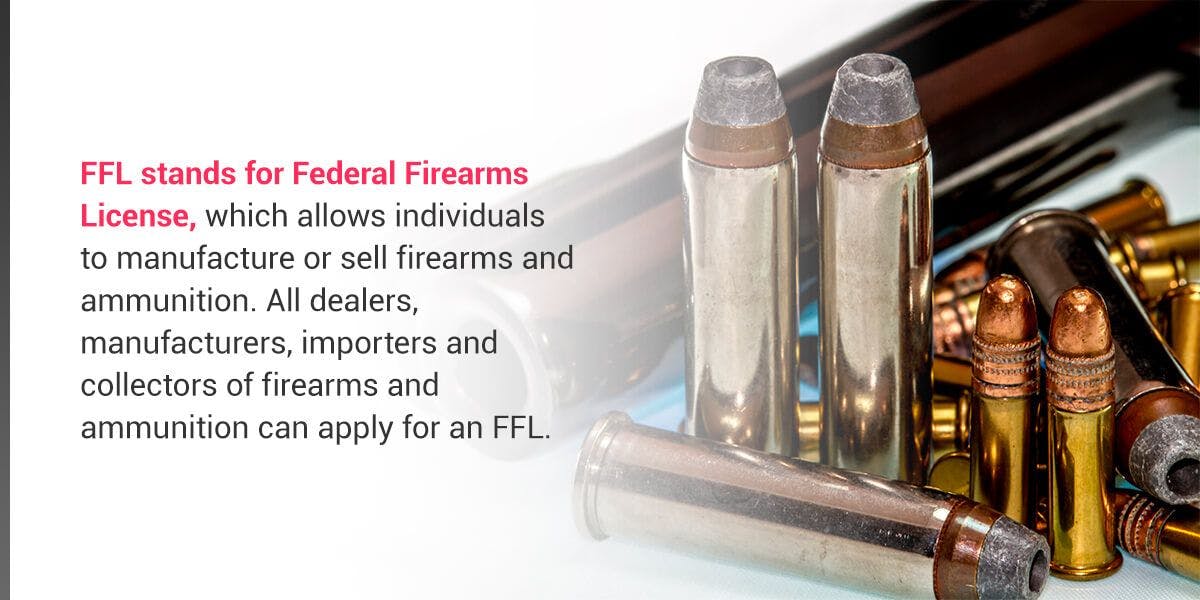
FFL stands for Federal Firearms License, which allows individuals to manufacture or sell firearms and ammunition. FFLs are administered by the United States Bureau of Alcohol, Tobacco, Firearms and Explosives, or ATF, an agency in the Department of Justice. While there are nine types of FFL , the ATF has classified licenses from Type 01 to Type 11. All dealers, manufacturers, importers and collectors of firearms and ammunition can apply for an FFL.
Regulation of the firearm industry started with the Federal Firearms Act of 1938, which required businesses and individuals involved in manufacturing, selling or purchasing firearms to hold a license. Then, the Gun Control Act was passed in 1968 to more extensively regulate who can hold an FFL. In short, firearms licenses are a gun control measure that ensures only certified individuals can be dealers.
Why An FFL Is Important
Having an FFL is incredibly important if you’d like to start your own firearm and ammunition business. If you aren’t a licensed, certified firearm dealer, you can face penalties of either up to five years in prison, a fine of up to $250,000 or both, so you’ll want to ensure you’re eligible for and obtain an FFL.
It’s still important to get a license even if you only sell firearms over the internet or at gun shows, as the ATF can still consider that engaging in the firearm dealing business. Mainly, you’ll need to obtain an FFL if you’re planning on buying or selling firearms multiple times with the primary goal of making a profit. However, if you’re only going to occasionally purchase firearms for your own personal collection, you don’t need to have an FFL.
In general, U.S. courts have identified the following factors to help determine your business’s purpose and whether you need to obtain an FFL:
- If you repetitively buy or sell firearms: While there’s no set threshold number of firearms bought and sold that suggests this guideline, even a few transactions combined with other evidence can suggest that you’re engaged in the firearm business. Some courts have even deemed entities businesses when they’ve dealt as few as two guns, so it’s a good idea to get an FLL if you’re going to sell firearms.
- If you’re looking to make a profit from purchasing or selling firearms: If your livelihood depends on the firearms trade, you must have a license. While you can technically be engaged in the firearms business without making a profit, you can also sell firearms for the principal purpose of profit without firearm-related transactions comprising of your main business activities. In other words, even if you have a full-time job and use firearms to supplement your income, you should still obtain an FFL.
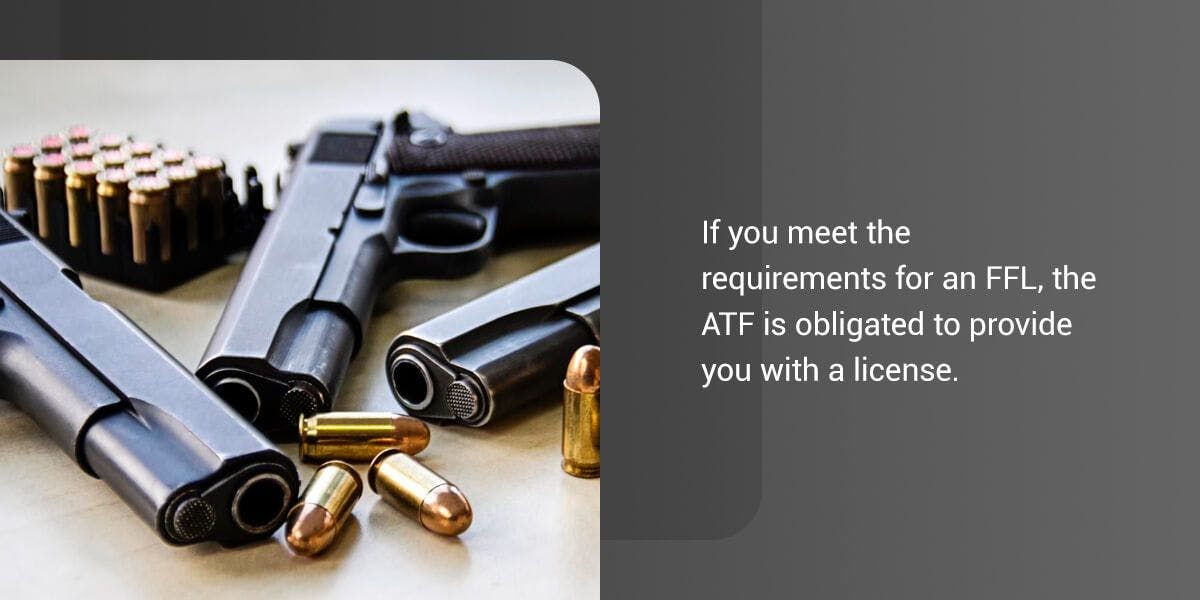
WHO IS ELIGIBLE FOR AN FFL?
Before applying for an FFL, you should make sure you and your business are eligible. If you meet the requirements for an FFL, the ATF is obligated to provide you with a license. The FFL is a “shall issue” license rather than “may issue,” meaning the ATF has to give a license to everyone who qualifies.
It’s also worth noting that you must have solid business intent, even if you don’t consider your store an official gun store. Before applying for an FFL, your business must already be formed properly and registered with your state. Alongside that, you must consider other FFL requirements.
Requirements For FFL License
Before applying for an FFL, you should make sure you and your business are eligible. If you meet the requirements for an FFL, the ATF is obligated to provide you with a license. The FFL is a “shall issue” license rather than “may issue,” meaning the ATF has to give a license to everyone who qualifies.
It’s also worth noting that you must have solid business intent, even if you don’t consider your store an official gun store. Before applying for an FFL, your business must already be formed properly and registered with your state. Alongside that, you must consider other FFL requirements.
All individuals must have the following qualities to be eligible for an FFL :
The applicant must also certify that:
Gun Control Act Prohibited Persons
- Convicted felons who have committed a crime punishable by one year of incarceration
- Fugitives wanted by law enforcement
- Unlawful users of controlled substances
- Mentally defective individuals or those who have been committed to a mental institution
- Illegal immigrants
- Dishonorably discharged veterans
- People who have renounced their U.S. citizenship
- Subjects of court restraining orders for harassing, stalking or threatening an intimate partner or their child
- Felons convicted of a domestic violence crime
Be sure to understand your local firearm laws, as different states have different requirements. To obtain an FFL, you must be permitted by local and state law to conduct your business.
WHAT ARE THE TYPES OF FFLs?
The ATF lists nine types of FFLs for firearm and ammunition manufacturers, merchants, buyers and collectors. The ATF has listed the following types of FFLs :
If you’re a dealer, importer or manufacturer of firearms, destructive devices and ammunition, you’ll need to figure out what type is best for you. If you’re a dealer, you should apply for a Type 01, 02 or 09 FFL. Alternatively, manufacturers should apply for a Type 06, 07 or 10, while importers need Type 08 or 11.
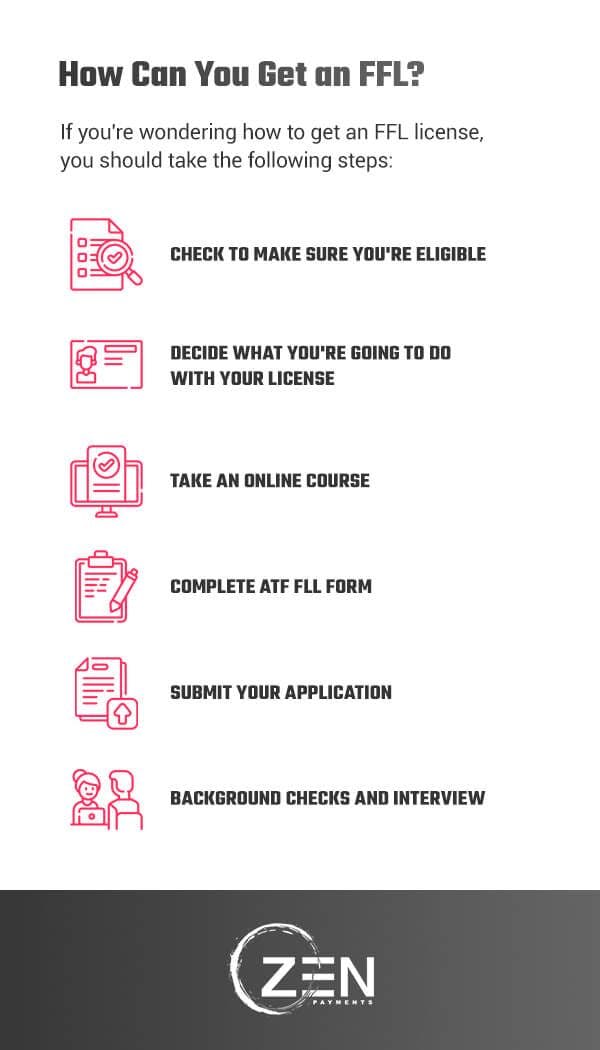
HOW CAN YOU GET AN FFL?
If you’re planning on starting a firearm and ammunition business, you’re now probably wondering the next steps on how to get a federal firearms license. After figuring out whether you’re eligible, you’ll have to follow the instructions to apply for an FFL with the ATF. The ATF also recommends making a copy of your application for your own personal records.
If you’re wondering how to get an FFL license, you should take the following steps:
1. Check to Make Sure You're Eligible
First, you’re going to want to make sure you qualify for an FFL. Review the ATF requirements to make sure you’re eligible to apply for an FFL and ensure you’re not prohibited from getting an FFL. This way, you won’t waste time trying to obtain an FFL when you’re ineligible..
2. Decide What You're Going To Do With Your Federal Firearms License
After you’ve confirmed your eligibility for an FFL, you’ll want to figure out what you’re going to do with your license. As previously described, there are nine types of licenses you can consider. Review the types of licenses and your business objective to decide which license is right for you.
3. Take an Online Course
While not technically required, taking an online course can help you make sure you fully understand firearm licenses and laws. These courses will help you ensure you’re fully covered by allowing you to get advice from a licensed firearms attorney. An industry professional has the expertise to advise you about both the ATF and the firearms industry.
Additionally, online courses can help ensure you’re up-to-date with the latest firearms laws, and some even offer compliance training for both you and your employees. Do your research to make sure you choose a certified FFL course — it could help you catch a policy or law you might have missed.
4. Complete ATF FLL Form
Next, locate the FLL form, or Form 7 , on the ATF website. Diligently complete all required information on the form, and remember to include the proper application fee. Make a payment by either using cash, check or credit card. Application fees can range from $30 to $3,000 — it depends on which type of license you’d like to acquire.
If you’re applying for a license for the first time, you’ll also have to complete Part B of the application, which is the Responsible Person Questionnaire . A responsible person is defined by the ATF as anyone who has the power to direct business policies and procedures or activities that pertain to firearms. This part of the application asks you about your previous relationships with FLLs, including whether you’ve held an FLL before or you’ve been denied an FLL. It also makes sure you’re not prohibited from getting an FLL.
If you’re applying for any type of FLL other than Type 03, the license for collectors of curios and relics, you’ll also need to include a 2-by-2 inch photograph of each responsible person on the license and an FD-258, or a fingerprint identification card, of each responsible person.
5. Submit Your Application
When you’re ready to submit your application, thoroughly review all of your materials to ensure you’ve included all of them. Then, you’re ready to mail in your application. While the ATF allows for the electronic submission of some firearms forms, the FFL application is only mail-in. After you submit your application to the address on the form, the Federal Firearms Licensing Center (FFLC) will review the form to ensure all information is correct.
6. Background Checks and Interview
Once your application is submitted, the FFLC will enter your application information into its database and conduct an internal review of all application materials, including fingerprint cards and photographs for all applications except for Type 03. The FFLC will also conduct a full electronic background check on all responsible persons. Then, the FFLC will send your application to the nearest ATF field office for the business’s location.
After conducting a background check and submitting your application to your local ATF field office, the field office supervisor will contact an Industry Operations Investigator to hold an in-person interview with you. During this interview, you’ll discuss your application to ensure it’s up-to-date and correct and review federal, local and state firearm laws.
Then, the Industry Operations Investigator will write a report from the interview and their inspection and recommend that the FFLC either accepts or denies your application. The ATF field office supervisor will also review the Industry Operations Investigator’s report and submit their recommendation. The entire process takes about 60 days. However, you can see the current processing time for firearm forms on the ATF website.
If you’re planning on starting a business in firearms and ammunition, you’ll want to ensure you get an FFL. However, once you’re licensed and your business is up and running, you’ll want to find a high-risk firearms merchant account service like Zen Payments. Those in the firearm industry are automatically labeled high-risk, making it difficult to find merchant account services and gateway payment providers.
Contact Zen Payments today to learn more about how we can help your business succeed.
Table of Contents
- • WHAT IS AN FFL?
- - Why An FFL Is Important
- • WHO IS ELIGIBLE FOR AN FFL?
- • Requirements For FFL License
- • Gun Control Act Prohibited Persons
- • WHAT ARE THE TYPES OF FFLs?
- • HOW CAN YOU GET AN FFL?
